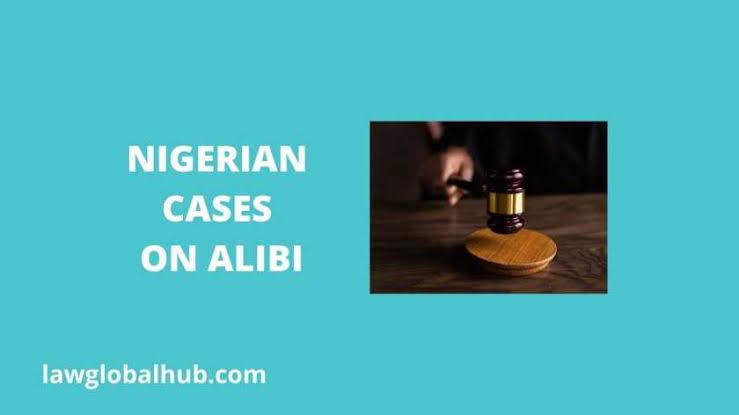Nigerian Cases about Alibi
Below are some rationes decidendi about Alibi in Nigerian cases. Alibi is a claim of being somewhere else at the time a crime was committed.
Meaning of Alibi
ALHAJI MUSA SANI V. THE STATE (2015) Legalpedia (SC) 51133
“Alibi is a Latin word meaning “Elsewhere”. Where an accused person claims he was somewhere else and could not have been at the scene of crime and could therefore not have committed the crime with which he is charged and gives particulars of his whereabouts at the material time to the Police at the earliest opportunity, the Police has a duty to investigate that claim no matter how unreasonable or stupid the claim or plea may seem.” PER N. S. NGWUTA, J.S.C
How to disprove Alibi
DAVID OMOTOLA V THE STATE (2009) Legalpedia (SC) 19416
One of the ways by which the prosecution may disprove an alibi is to call evidence against it which is cogent, substantial and credible. The fact that an accused has raised an alibi by his evidence or that of his witnesses does not imply that the alibi must be accepted by a court. If the evidence called by the prosecution is credible, strong and compelling, the court may reject the defence of alibi. – Per Oguntade, JSC
When the Defence of Alibi should be raised
Rabiu v. State (2010) 10 NWLR (Pt. 1201) 127
A defence of alibi must be unequivocal and must be raised by an accused at the earliest opportunity during investigation of the allegation against the accused person and not during trial. This will enable the prosecution investigate the truth of the alibi. However, failure of a defence of alibi does not mean the guilt of the accused. In the present case, the defence of alibi was raised during trial by the appellant. The prosecution whose duty it is to disprove the alibi where properly raised, did not have the time or opportunity to investigate the alibi or to adduce evidence in rebuttal of the defence.
Kareem v. State (2021) 17 NWLR (Pt. 1806) 503
An accused person must raise his alibi at the earliest opportunity, preferably in his extra-judicial statement. He must not be allowed to use alibi as trump card to scuttle prosecution. This is to offer the Police an opportunity either to confirm or confute its availability to the accused person. The accused seeking to benefit from such defence of alibi must open up and provide substantial details as to particulars. The defence of alibi would be unavailing where the accused person raised it during the trial.
When Alibi should or should not be investigated
AYUBA v. STATE (2021) LPELR-55745(CA)
“Similarly, in Adebiyi vs State (2016) 1-2 S.C (pt iv) 95, the Supreme Court held: “Alibi means elsewhere. The accused person is saying that at the time the offence for which he is charged was committed, he was somewhere else so he could not have committed the offence. It is a matter within the personal knowledge of the accused. After an accused person is arrested he should raise the defence of alibi (if that is his defence) at the earliest opportunity, usually in his statement to the Police.
An alibi must be very detailed on the exact whereabouts of the accused person. He could refer to persons that the Police can contact to show that his alibi is true. The onus is thus on the accused person to rely on evidence to support his alibi, and the standard of proof required to establish an alibi is on balance of probabilities. Once an accused person raises the defence of alibi, it is the duty of the Police to investigate it to see if it is true. There would be no need to investigate an alibi if there is overwhelming evidence against the accused person. See Osu v. State (2013) 1-2 SC p.37 Ajayi v. State (2013) 2-3 SC (Pt. 1) p.143 Aliyu v. State (2013) 6-7 SC (Pt. iv) p.1 Ozaki v. State (1990) 1 SC p. 109.” Per EBIOWEI TOBI, JCA
Duty of the Police to Investigate Alibi
OROBOSA EYONAOWA v. COMMISSIONER OF POLICE (2014)LCN/7662(CA)
It is trite law that once an accused person raises the defence of alibi at the earliest opportunity as in this case, the onus rests on the Police to investigate the said alibi. The learned trial judge at pg. 60 of the record conceded that the appellant raised the defence of alibi timeously and at the earliest opportunity. per. TOM SHAIBU YAKUBU, J.C.A.
Effect of a successful plea of Alibi
Kareem v. State (2021) 17 NWLR (Pt. 1806) 503 – Supreme Court
A successful plea of alibi results in the acquittal of the defendant. Alibi is a radical, sweeping and far-reaching defence which, where proved, serves to completely exculpate the defendant from the offence charged.
See also:


Leave a Reply